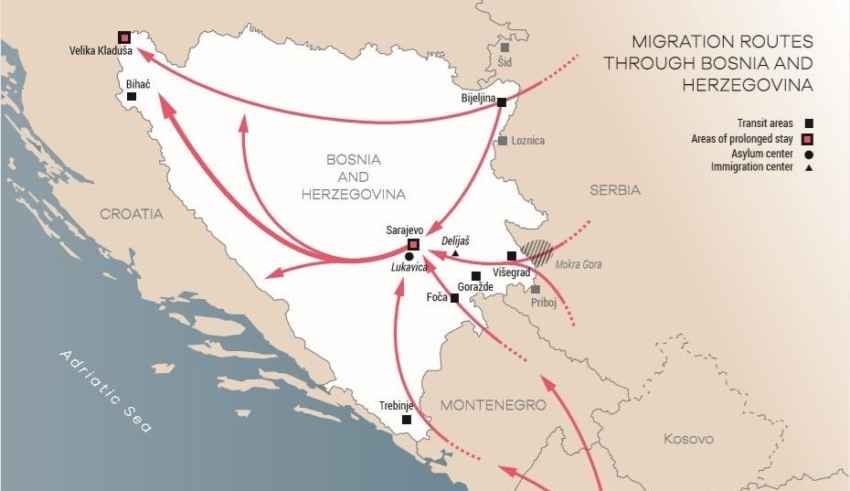
In the last two years, the Balkan route has become one of the most frequented routes for illegal and uncontrolled immigration. Afghans, Pakistanis and especially Syrians have embarked on the dangerous journey to survive war and misery via the Balkan route[1]. The region already suffers from its own political, economic and social instability and fragility, and the challenge of the inflow of refugees is consequently very difficult to manage.
Many European countries including Hungary, Greece and Croatia have closed their borders, making the flow of migrants into the Balkan territory even more difficult. Above all, the strict closure of Croatia’s borders with Bosnia and Herzegovina has led to many problems in the management of refugee camps in Bosnia, where there are no minimum conditions of accommodation. Despite the fact that the European Union allocates substantial funds to Croatia for the setting up and running of refugee camps, the problem persists and worsens, and violations of international law become apparent to all. There are also considerable problems in Macedonia and Serbia, where the difficult ethnic and religious coexistence is compounded by this humanitarian crisis and the proliferation of the risk of the creation of jihadist cells. These cells find fertile ground for their development thanks to the lack of adequate government instruments capable of identifying, controlling and suppressing them.
One of the most important preconditions for state sovereignty is the right to control one’s own borders. No state has ever questioned this right, and in the recent pandemic situation it has become evident how and to what extent it is exercised by states. However, this right clashes with other human rights enshrined in international conventions, such as Article 12 of the 1966 Covenant on Civil and Political Rights, which states that ‘Everyone is free to leave any country, including his own’. Also not very clear are the actions of Frontex, the European Border and Coast Guard Agency, which has a lot of funding to strengthen and manage the European borders as best as possible. In a few cases, non-governmental organisations have criticised Frontex for failing to monitor and report on violations of migrants’ rights at Europe’s borders and for taking part directly in rejections that are contrary to the principle of non-refoulement. They, together with some media organisations, accused the Agency of not respecting certain fundamental rights, including the principle of non-refoulement, a principle of common law, enshrined in Article 33 of the Geneva Convention, reaffirmed in European law in Articles 18 and 19 of the Charter of Fundamental Rights of the European Union (CFREU) and expressed in Article 4 of the Additional Protocol No 4 to the ECHR. Article 33 of the Convention reads: “No Contracting State shall expel or return a refugee in any manner whatsoever to the frontiers of territories where his life or freedom would be threatened on account of his race, religion, nationality, membership of a particular social group or political opinion.”
confusion, which often gives rise to real contradictions that are absolutely foreign to the founding principles of the European Union. This is certainly one of the fundamental reasons for Europe to pay attention to it and, with regard to the migration crisis and the use of the Balkan route as a vehicle for its illegal and life-threatening development, the most effective mechanism is to speed up the accession processes of the Balkan countries. This seems to be the most effective strategy for definitively stabilising a region that needs a framework of international legality and security. This is not only to balance tensions in this region but also to protect and safeguard border security. Migratory flows, in addition to being an issue of human rights protection, must also be managed effectively in order to regularise a distribution of the migratory population that is in line with social, economic and political developments within the European Union.
[1]https://resourcecentre.savethechildren.net/pdf/refugees_and_migrants_balkans_regional_overview_q2_2019_sc_bmdh_data.pdf
By The European Institute for International Law and International Relations.














